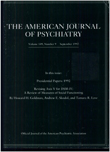Neuropsychological testing of patients with borderline personality disorder
Abstract
OBJECTIVE AND METHOD: This study examined whether a battery of neuropsychological tests could detect cognitive deficits--particularly in the areas of perception, learning, and memory--in patients with borderline personality disorder. The test battery was completed by 16 research outpatients with borderline personality disorder, typified by behavioral dyscontrol and diagnosed according to DSM-III-R criteria and the Diagnostic Interview for Borderline Patients. A comparison group of 16 normal volunteers also completed the test battery. RESULTS: The performance of the borderline patients was significantly impaired in comparison with that of the normal group on memory tests requiring uncued recall of complex, recently learned material. Cues given on an auditory memory task partially corrected that deficit. The patients' performance was also significantly impaired on several visual perceptual tests. These deficits do not appear to have been attributable to attentional problems, psychomotor impairment, current major depression, or history of alcohol abuse. CONCLUSIONS: The observed difficulties in separating essential from extraneous visual information and in recalling complex material may be relevant in understanding some of the clinical features of borderline personality disorder. The observed memory improvement resulting from cueing suggests specific strategies that may be used to aid patients' recall of complex material.
Access content
To read the fulltext, please use one of the options below to sign in or purchase access.- Personal login
- Institutional Login
- Sign in via OpenAthens
- Register for access
-
Please login/register if you wish to pair your device and check access availability.
Not a subscriber?
PsychiatryOnline subscription options offer access to the DSM-5 library, books, journals, CME, and patient resources. This all-in-one virtual library provides psychiatrists and mental health professionals with key resources for diagnosis, treatment, research, and professional development.
Need more help? PsychiatryOnline Customer Service may be reached by emailing [email protected] or by calling 800-368-5777 (in the U.S.) or 703-907-7322 (outside the U.S.).



